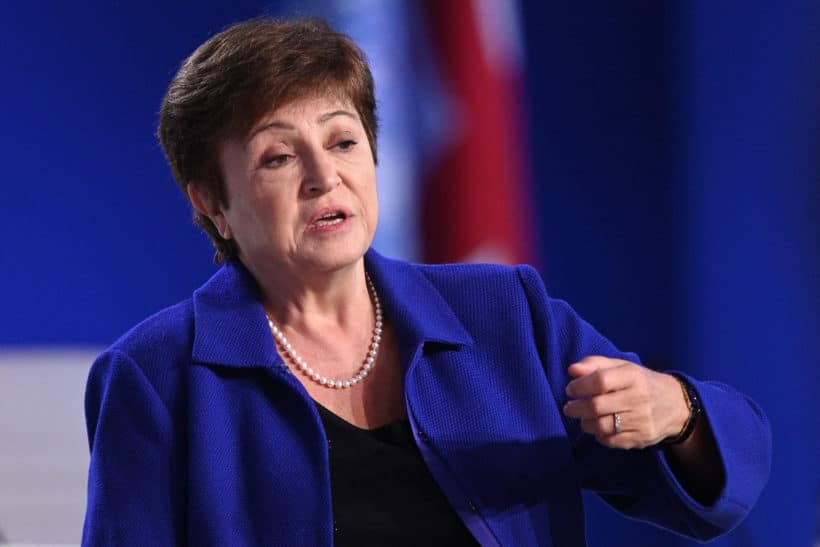
Oct 5 (Reuters) – Stronger demand for services and progress on lowering inflation have increased the chances that the global economy can escape recession, but fiscal and financial risks abound, IMF chief Kristalina Georgieva said on Thursday.
Georgieva, setting the stage for next week’s annual meetings of the International Monetary Fund and World Bank, said successive shocks since 2020 had slashed $3.7 trillion from global output, current growth remained well below pre-pandemic levels, and medium-term growth prospects had weakened further.
Stubborn inflation meant interest rates would have to remain “higher for longer” and economic fragmentation threatened to hit emerging and developing economies hardest, she said.
In remarks prepared for a speech in Abidjan, Ivory Coast, Georgieva said the IMF’s new World Economic Outlook, coming out on Tuesday, would show a slow and uneven recovery, with stark differences emerging in trends across the globe.
“The world economy has shown remarkable resilience, and the first half of 2023 has brought some good news, largely because of stronger-than-expected demand for services and tangible progress in the fight against inflation,” Georgieva said in the prepared remarks. “This increases the chances for a soft landing for the global economy. But we can’t let our guard down.”
Georgieva said the current pace of growth was “quite weak,” well below the 3.8% pre-pandemic average, and inflation would likely remain above target in some countries until 2025.
“Fighting inflation is the No. 1 priority,” Georgieva said, noting that high prices undermined consumer and investor confidence, and hit the poorest people in society hardest.
“Winning the fight against inflation requires interest rates to remain higher for longer,” she said. “It is paramount to avoid a premature easing of policy, given the risk of resurging inflation.”
Georgieva said expectations of a “soft landing” had helped boost various asset prices, but a rapid resurgence of inflation could lead to a sharp tightening of financial conditions.
The IMF chief’s somber message comes days before finance ministers and central bankers from 190 countries gather in Marrakech for a week of meetings about the risks facing the global economy.
The meetings are the first on the African continent since they were held in Nairobi, Kenya in 1973, and they will take place not far from the epicenter of a devastating earthquake in Morocco that killed 2,900 people.
Georgieva underscored stark differences in growth dynamics, noting that the United States is the only major economy that had seen output return to pre-pandemic levels, and calling out India and Ivory Coast as other bright spots.
But most advanced economies are slowing and economic activity in China, the world’s second-largest economy, remains below expectations, she said, with many other countries struggling with “anemic growth.”
Economic fragmentation – marked by protectionism, export controls and a retreat from global trade – threatened to further undermine growth prospects, especially for emerging and developing economies, she said.
Many countries also faced significant fiscal risks and urgently needed to rebuild their buffers, with Africa and other regions seeing a further rise in debt burdens.
She said banks were also facing pressures and called for urgent steps to strengthen the global financial safety net. IMF analysis showed that 100 emerging and low-income countries – including most African nations – lacked sufficient resources and access to swap lines, leaving them exposed in the event of a financial crisis, she said.
The IMF, which has provided about $320 billion in financing to 96 countries since the pandemic, also needed to bolster its lending capacity, Georgieva said, urging member countries to act to increase its quota resources.
She also called for the fund’s stronger members to step in with more financing for the Poverty Reduction and Growth Trust, which serves the poorest members, as well as its new $40 billion Resilience and Sustainability Trust, which provides longer-term financing for climate reforms.
(Reporting by Andrea Shalal; Editing by Andrea Ricci)

